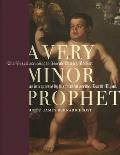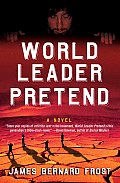
For everyone I know who is a writer, there was some awkward time in their lives when they had to learn to call themselves one. You'd make a few sales to the local newspaper... Did that make you a writer? Your friends who ran a small literary journal and published a story of yours... Did that make you a writer? You self-published a poetry chapbook... Were you a writer now? Even when bigger things happened — your first sale to a major magazine, a book deal with a small press — you still weren't comfortable with the words
I'm a writer.
I had just turned 28 and sold my first book, a travel guide for vegetarians, but I'd tell people about the day job that I didn't care about instead — I placed banner advertisements on the web for a search engine company. And when I quit my job in order to finish the book, I'd tell people that I was unemployed, or even, with a chuckle, that I'd retired. But never that I was a writer. It sounded fake or pretentious to say it.
Once the travel guide came out and won an award, once I got an MFA in creative writing, once I sold my next novel, I finally started telling people that I was a writer. I remember how special that year felt. I was 30, and, for the first time in my life, I felt like I knew who I was in the world, and that I could tell people with my head held high what my career was.
That feeling of peacefulness and security didn't last. I might have been a writer, but I still hadn't figured out how to make a living.
Writers make a living in, as far as I can tell, about five different ways.
The first, and by far the best, is the Big Agent way. All your big name authors have big agents, and these big agents get their authors big money book deals. Not all of these writers are loaded ? a quarter of a million dollar book deal gets spread quite thin when you have to pay off your agent and your taxes ? but they're pretty set as long as they can pump out a book every year or two. Of course, these writers are completely unbearable, but that's a subject for another blog entry.
 The second I'll call the Poverty Freelancer route. This is one of the more noble, but treacherous ways that writers I know get by. Basically, the Poverty Freelancer is childless, lives in a small apartment, and gets by as a writer by being an expert in a field. These are your prolific automobile enthusiasts and lesbian romance writers. They have a niche, whether it be in magazines or ebooks, and they eek out just enough money by producing massive amounts of material and constantly self-promoting.
The second I'll call the Poverty Freelancer route. This is one of the more noble, but treacherous ways that writers I know get by. Basically, the Poverty Freelancer is childless, lives in a small apartment, and gets by as a writer by being an expert in a field. These are your prolific automobile enthusiasts and lesbian romance writers. They have a niche, whether it be in magazines or ebooks, and they eek out just enough money by producing massive amounts of material and constantly self-promoting.
The third direction writers seem to go is the College Professor. The pay isn't great, but it's consistent, and because you're teaching English, you can hang on to your writer credentials even if you're only getting a book out every five years or so.
The fourth way is the Completely Unrelated Second Job. This one takes real dedication and organization — you're writing on top of a 40-hour-a-week job — so you have to dedicate the wee hours of your mornings or weekends to make it happen.
Finally, we have the Sugar Momma/Pappa route. Some people have wealthy parents or a partner, and they can sit at a writing desk all day long without a care in the world. Unfortunately, it rarely comes without strings attached.
So, back to me. When I finally began to call myself a writer, I didn't realize that I had to make a living a different way. I muddled about. I tried to find a big agent, but I failed at ass kissing New Yorkers. I messed around as a freelancer, but after I had children I couldn't live with the poverty. I didn't have the heart for teaching — all I wanted to tell students was "Please... don't... become... a... writer..." I quit my unrelated second jobs because I couldn't seem to spend that much time doing work I didn't care about. The sugar momma route made me feel guilty as sin.
None of it worked out.
Last week, I was eating gourmet ice cream in Seattle after a reading at Elliot Bay Books. A friend of mine named Robert, knowing me well, bought the ice cream. I'm painfully aware that I've been calling myself a writer for 13 years, but I still don't know what to do with my life. I told Robert a little bit about what I was feeling and what my latest how-do-I-make-a-living scheme was. (Very dangerous territory, the Somewhat Related Second Job.)
Robert said something to me that I'd like to take to heart. He said, "Jim, you're in your 40s and you still care about who you are in the world. Most people don't think about that anymore. That's really cool."
A nice sentiment from Robert, but I already know who I am in the world: I'm a writer. My problem is getting my hands on that icky green stuff.